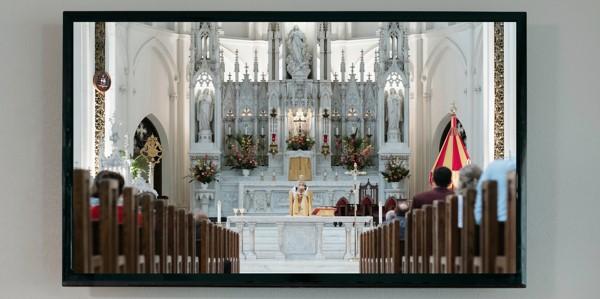In the prayers of spiritual communion that so many people have made during their participation in livestreamed Masses this year, they have given voice to their desire for union with Christ. Michael Holman SJ explores the many ways in which this desire has been understood and expressed in the Christian tradition, so that we might reflect on our longing for God to be with us in the final days of Advent.
In each and every Mass I have celebrated in Farm Street church since the beginning of the first lockdown back in March, I have recited, mainly for the benefit of those participating through the internet, St Alphonsus Ligouri’s prayer of spiritual communion.
This prayer, in the version I have to hand, begins with a statement of belief: ‘My Jesus, I believe you are present in the most holy sacrament of the Eucharist’. It continues with a response of love and longing: ‘I love you above all things and desire to receive you into my soul’. There is then a statement of fact: ‘Since I cannot receive you sacramentally at this time’, followed by a petition, ‘come to me spiritually’. The prayer ends by speaking of the unity of Christ with the believer and the believer with Christ: ‘I embrace you as already being here. I unite myself wholly to you’; and an aspiration that this unity may persist always, ‘never let me be separated from your love. Amen.’
St Alphonsus’s prayer is first and foremost an expression of a desire for union with Christ. I have found it helpful to enter into the meaning of this prayer by reminding myself, with the help of the patristic readings in the Divine Office, of the significance of desire for union with Christ in all our prayer.
St Gregory of Nyssa wrote that ‘the language of souls is their desire’. My hope is that some of the quotations that follow, their words but above all perhaps the images they convey, will, as they have helped me, help those making a retreat in daily life at this time, or others who are regularly making a spiritual communion.
I remember being told, while training in directing the Spiritual Exercises in the United States many years ago, that our desire is not peripheral but central to our prayer. What we ‘do’ in prayer, be it meditate or engage in contemplation or in an application of the senses, supports that desire, the id quod volo, what it is I am looking for. Our desire is the point at which the Creator deals directly with the creature. As our relationship with the Lord develops, so too does the grace we are seeking.
For Olivier Clément, in the first chapter of his The Roots of Christian Mysticism, our desire for God has its origin in our experience of human finitude. In the words of St Gregory of Nyssa, ‘we lead a dead life’: everything gravitates towards nothingness. Unlike the animals, we know we shall die. ‘But our very anguish is a source of grace’, Clément goes on, ‘for it betrays a longing for being and unity; a longing to know the Being and the One’. As Irenaeus of Lyons has written, ‘for communion with God is life and separation from God is death’.
For Augustine, that desire is itself inspired by the Holy Spirit who gives us a foretaste of what it is we desire, else we could not desire it. ‘So the Spirit moves the saints to plead with sighs too deep for words by inspiring in them a desire for the great and as yet unknown reality that we look forward to with patience. How can words express what we desire when it remains unknown? If we were entirely ignorant of it we would not desire it’. And yet, he goes on, ‘we would not desire it or seek it with sighs, if we were able to see it.’
For St Anselm, the Lord himself is to be found in the very act of seeking. After commenting on a verse in psalm 26 – ‘It is your face O Lord that I seek, hide not your face’ – he prayed:
Teach me to seek you, and when I seek you show yourself to me, for I cannot seek you unless you teach me, nor can I find you unless you show yourself to me. Let me seek you in desiring you and desire you in seeking you, find you in loving you.
Having encountered him, we will desire him all the more, as St Columbanus writes,
If you thirst, drink of the fountain of life; if you are hungry, eat the bread of life. Blessed are they who hunger for this bread and thirst for this fountain, for in so doing they will desire ever more to eat and drink. For what they eat and drink is exceedingly sweet and their thirst and appetite for more is never satisfied. Though it is ever tasted it is ever more desired.
We often speak, as St Columbanus does, of our desire in terms of a ‘hunger’ for God, but St John Climacus thought ‘thirst’ a more appropriate image. ‘Hunger makes itself felt only gradually and vaguely, but the raging of intense thirst is unmistakeable and intolerable’. Indeed: ‘Blessed is the person whose desire for God has become like a lover’s passion for the beloved’.
St Augustine wrote that our desire is the way in which we fulfil the Lord’s command to ‘pray always’. This is not so much a matter of saying one prayer after another, rather:
There is another inward kind of prayer without ceasing, which is the desire of the heart. Whatever else you are doing, if you do but long for that Sabbath, you do not cease to pray. If you would never cease to pray, never cease to long after it. The continuance of your longing is the continuance of your prayer.
St Augustine encourages us to exercise our desire in prayer: ‘The entire life of a good Christian is in fact an exercise of holy desire. You do not yet see what you long for, but the very act of desiring prepares you, so that when he comes you may see and be utterly satisfied’. As you might stretch a skin to increase its capacity to hold wine, so our desire increases our capacity for God. ‘By stretching it, therefore, you increase the capacity of the sack, and this is how God deals with us. Simply by making us wait he increases our desire, which in turn enlarges the capacity of our soul, making it able to receive what is to be given to us.’
A merchant preparing a skin will need to remove from it anything which may reduce its capacity to hold wine, so we need to ‘free ourselves from desires leading to infatuation with this world’. ‘If he wishes to fill you with honey and you are full of sour wine, where is the honey to go? The vessel must be emptied of its contents and then be cleansed.’
For Thomas Aquinas, it’s a matter of our desires being aligned with those of Christ:
Do not be attached, therefore, to clothing and riches, because ‘they divided my garments among themselves’. Nor to honours, for he experienced harsh words and scourings. Nor to greatness of rank, for ‘weaving a crown of thorns they placed it on my head’. Nor to anything delightful, for ‘in my thirst they gave me vinegar to drink’.
I wonder if we don’t align our desires with those of Christ most of all when we love our neighbour. ‘By loving your neighbour you prepare your eye to see God’, wrote St Augustine. He goes on to say, interestingly, that we can see God here and now both in our neighbour and in the love within us which impels us to love our neighbour: ‘Love your neighbour, then, and see within yourself the power by which you love your neighbour; there you will see God, as far as you are able.’
It may be in times of suffering, or when our woundedness or vulnerability is exposed, that our desire is purified and strengthened. St John of the Cross wrote: ‘There are depths to be fathomed in Christ. He is like a rich mine with many recesses containing treasures … For the gate whereby one may enter into these riches of wisdom is the narrow gate of the cross’.
For St Teresa of Avila, our desire to be with Christ is indicative of a close relationship which will never disappoint. ‘What more do we desire from such a good friend at our side? Unlike our friends in the world, he will never abandon us when we are troubled or distressed. Blessed is the one who truly loves him and always keeps him near’.
All our desires will be fully satisfied in the life of heaven, as St Augustine writes. ‘In heaven is the fountain of life …. when our desire will be satisfied with good things, and there will be nothing to ask for with sighs but only what we possess with joy.’
Of this life of heaven, our communion with Christ in the Eucharist, for St Thomas Aquinas, is both a foretaste and promise. So our desire for Christ in the Eucharist crowns all our desires, since ‘unlike any other sacrament’, wrote Pope St John Paul II, ‘the mystery [of communion] is so perfect that it brings us to the heights of every good thing: here is the ultimate goal of every human desire, because here we attain God and God joins himself to us in the most perfect union’.
The last verse of Aquinas’s hymn, Adoro Te devote, in the translation by Gerard Manley Hopkins, might serve as an alternative prayer of spiritual communion.
Jesus whom I look at shrouded here below,
I beseech thee, send me what I thirst for so,
Some day to gaze on Thee face to face in light
And be blest forever with thy glory's sight.
Michael Holman SJ is Acting Superior of the London Jesuit Community.






